My friends had been pushing me to watch the new PBS show “Market Warriors” since it began airing a couple weeks ago. Not because it was entertaining and they thought that perhaps I could learn something from it.
It was because the show was so awful. Like me, these friends are into auctions, flea markets, antiques and vintage items. Rebecca is an avid collector of African American artifacts and books. My auction buddy Janet and I have been going to auctions since forever. We all know a thing or two about what’s valuable and what isn’t, what sells and what doesn’t sell. But there’s a heck a lot more we don’t know.
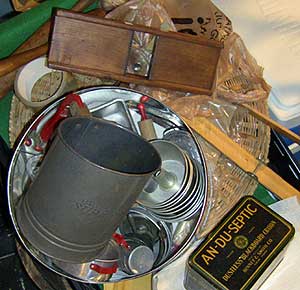
That last part seemed to fit the four pickers on the TV show. They don’t appear to know squat. I decided last night to give up my 9 p.m. TNT show “The Closer” so I could finally catch an episode of “Market Warriors.”
So I sat back to watch as the cast were given $1,000 and the assignment to find advertising items in an antiques market in Cumming, GA, just outside Atlanta. The aim was for them to get the best price for an item to be later sold at an auction house in Cincinnati, OH. The winner would be the one who made the most profit from the sale of his/her items. They were against the clock for most of their pickings.
The key to winning this competition – and buying collectibles or anything else of this ilk – is to have a good eye and instinctively know what stuff is worth. Even if you’ve never come across an item before, you should have a solid idea of what something in its category is selling for.

I’ve been going to auctions long enough to know that it’s tough. But I also know how to be a smart buyer – even though I buy dumb sometimes like everyone else. I have enough bad purchases sitting on shelves in my basement to show for my missteps.
Last night’s Warrior show was inherently unfair, and the premise sounded like it came from a novice, which isn’t the case because the producers are the folks behind “Antiques Roadshow.” The pickers were set loose in an antiques market – where everything usually carries a very high markup – and were expected to find bargains to sell at low-rent prices. Their items were to be sold at Cowan’s Auction in Cincinnati, owned by Wes Cowan of PBS’ “History Detectives.”
The auction house sells some high-end items, but its clientele are also people like me who don’t spend a lot for stuff and dealers who want to buy low and flip.
The prices at the antiques market were outrageous, and the pickers paid them as if they were spending someone else’s money (oops, they were!). The female picker paid $100 for a nondescript lighted Coke sign that would’ve gone for $20 to $30 at the auctions I attend. I actually got a Coke sandwich shop sign at auction once for $5.
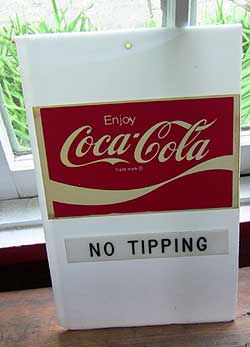
That Satsuma-style Asian teapot she bought for $85 was thrown out (it should’ve been literally trashed) by Cowan, who himself made light of some of the pickings. I had gotten a similar one with four teacups in a box lot and sold the set at a flea market for $5.
One of the male pickers bought a white potty seat with a new wooden enclosure because he remembered one like it from his childhood in Brooklyn. When I first saw him admiring the seat, I wondered who in the heck would buy it at auction. That was a no-brainer for me, but he paid $105 for it. He could’ve done better if he’d found a slop jar like the decorative ones I came across at auction once or the ornate antique toilet bowl I saw at another sale.
Another of the men picked up an Art Deco-style sign for a company whose name I did not recognize – Pennvernon Window Glass. The idea behind advertising is to choose something that folks can identify with. I couldn’t on this one. He paid $295 for the sign, which sold at auction for $150. Interestingly, a similar countertop sign sold at Cowan’s in May for $176.25.
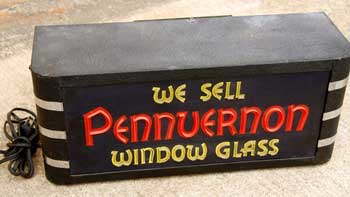
I thought the Red Rock Cola paper-bag holder purchased by another picker was neat – $30 neat, not $200 neat. I had never heard of Red Rock Cola, but if it had been Coke maybe it would’ve sold for more. But there’s no guarantee, because a lot of items with the Coke logo were made and all are not valuable. Recently, I got a mini Coke bottle lighter in a box lot that was selling for only $25 on eBay.
As I watched the warriors pay big money for items that I knew were worth much less, I wondered about who they were. So I went sleuthing on the Warriors website. They all have been in the antique, art or collecting business for up to 40 years, and presumably are experts. Although their expertise seemed to be broad, their choices on the show were myopic.
I’d suggest the producers add some diversity to the show. I go to enough auctions to know that African Americans and other people of color do flea markets, auctions, yard sales and cleanouts.
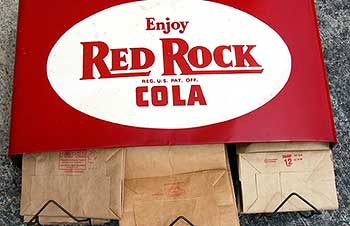
Give me and three of my friends $1,000 and let us troll a flea market or antiques market, and we’ll show you how to find items at a good price that will sell at a better price. Maybe Rebecca, Janet and I could put together a show for Magic Johnson’s new ASPiRE cable network. We wouldn’t just limit our purchases to African-American-related items because black folks buy, use and like the same items as anyone else.
We’d buy with our heads based on the knowledge we’ve acquired from years of learning on our own and from the plain old common sense of knowing in our guts that $75 is too much to pay for a wooden bakery advertising crate.
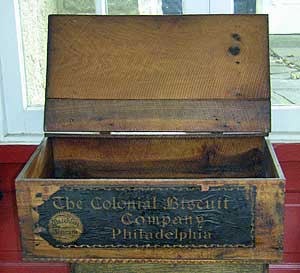

But why did you leave out the Chinese vase that he bought for $50 and it sold at auction at Cowans for $475? That was the best part of the show. Okay, but I’d admit the show is kind of stupid — that’s why I love it.
Hi Sarah. Making a huge profit on one item, unfortunately, doesn’t make up for the countless other ones that were a bust. I thought the premise of the show was faulty; it doesn’t make sense to buy retail at an antiques mall and then try to sell wholesale at an auction. Folks like me go to auctions to get items for the lowest prices we can. I would never go to an antiques mall looking for a bargain; those folks are dealers and they earn their living by buying low and selling high. I don’t begrudge them for doing that.
Sherry
My husband and I watch this show for the same reason your friends do. Oh, how I wish one of these experts had been at my yard sale last summer. I could have made a killing! What I don’t understand is how they can be so off on the value of something when it appears they all are allowed access to the internet while they are shopping.
You’re right, Joan. These folks are also experts with years of antiquing experience under their belts. They should be much more knowledgable.
Sherry
Just another fake show.
That could be a very interesting show if done better. Thanks, Max.
Sherry
Red Rock is one of the original brands of colas to be manufactured in the U.S. Lee Hagan and G. T. Dodd of Atlanta, Georgia founded the brand in 1885. They started the Red Rock Company in the beginning, to manufacture ginger ale. They added Red Rock Cola to their line in 1894. We restored this picnic cooler some years ago.